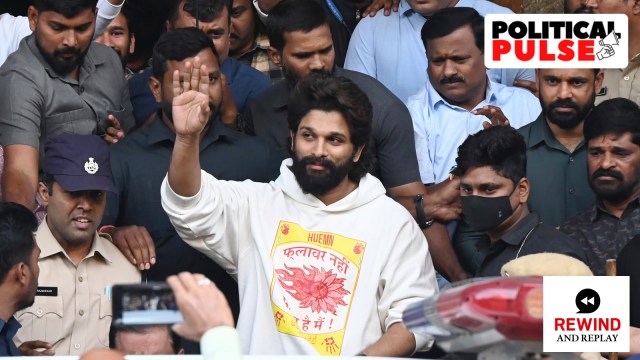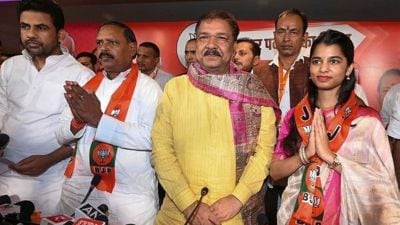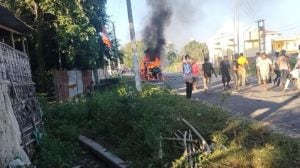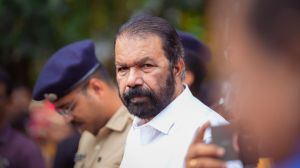‘A celebrity has the same rights as a citizen… can’t control everything’: What courts said in case against another star over another stampede
In 2017, a Youth Congress leader had filed a complaint against Shah Rukh Khan over death in an incident at the Vadodara Railway Station while the actor was promoting his film Raees
 Telangana H
Telangana HSeven years before Telugu star Allu Arjun was slapped with a case over the death of a woman in a stampede during a screening of his blockbuster Pushpa 2 in Hyderabad, superstar Shah Rukh Khan had been the subject of similar legal action. Khan was booked after a man was killed in a stampede at the Vadodara Railway Station while he was promoting his film ‘Raees’.
In fact, Arjun’s lawyer referenced Khan’s case – which was later quashed – during a bail hearing in the Telangana High Court.
What was the incident involving Khan?
In January 2017, Khan and actor Sunny Leone arrived at the Vadodara Railway Station on board the August Kranti Express as part of promotions for the film Raees, which is based in Gujarat. Fans had been gathering at the station several hours in advance in anticipation of the train.
When the August Kranti Express eventually chucked in, the actors did not step onto the platform, but just waved at the crowds from the footboard and appealed to them to watch the film over a mic.
But the surging crowd could not be controlled by the hapless Railway and police authorities, and the resultant stampede resulted in the death of Farid Khan. Several others, including railway policemen, sustained injuries.
What was the case against Khan?
The Superintendent of Police, Western Railway (Vadodara division), ordered a probe to ascertain whether the required permissions were granted to the organisers, and the alleged lack of coordination between the departments involved.
The complainant, Jitendra Solanki, a Vadodara Youth Congress leader, sought action against Khan and the makers of the film under then IPC Sections 336, 337, 338 and 304A – covering rash and negligent acts.
In his petition, Solanki asked why the Railway Police had failed to lodge an FIR even five months after the incident.
Consequently, the Railway Police (Vadodara division) issued a notice to Raees co-producers Excel Entertainment and the chief public relations officer of the Western Railway in January 2017 to continue its probe into the stampede.
The First Class Judicial Magistrate court in Vadodara then issued summons to Khan under the IPC and the Railways Act, asking both the actor and Excel Entertainment to appear in court.
Khan sought a stay from the Gujarat High Court against the police summons.
What did the Gujarat High Court say?
A primary investigation report submitted by Deputy Superintendent of Police Tarun Barot to the court in June 2017 stated that the actor could be booked under various sections of the IPC and Indian Railways Act, and that the stampede-like situation was created because the actor and his team “ignored the safety and security guidelines and hurled T-shirts and balls towards the excited public at the platform”.
The Gujarat government was against charging the actor, and told the High Court that Barot’s investigation report did not show that Khan’s actions “were the proximate cause for the incidents at the Railway Station, including the death of the person concerned”.
Justice Nikhil Kariel of the High Court went on to rule that Khan’s act of throwing balls and T-shirts at the crowd cannot be considered “acts of a very high degree of negligence or recklessness”. “The act on part of (Khan), more particularly the act of throwing ‘smiley balls’ and ‘T-shirts’ into the crowd, may have led to some of the members of the crowd getting excited. But in the considered opinion of this court, such acts on part of the petitioner could not be stated to be consisting of a very high degree of negligence or recklessness. Nor would the act concerned be… efficient cause (for) the unruly scenes that happened at the railway station,” the High Court said.
On April 27, 2022, the High Court finally quashed the proceedings of the magistrate court. Justice Kariel said: “If you want the trial to take place with regard to the alleged offence… imagine the kind of chaos that would be caused, even in courts. Do you want that?”
The judge added that Khan should apologise and put an end to the matter.
A senior government official told The Indian Express, “There was no case of negligence made out so the police had not booked an FIR, and (hence) there was no need for the state to challenge the Gujarat High Court order to quash the proceedings of the Vadodara court.”
What did the Supreme Court say?
Solanki filed a plea in the Supreme Court against the rejection of his case by the High Court. In September 2022, a Supreme Court Division Bench of Justices Ajay Rastogi and C T Ravikumar, also rejected Solanki’s plea.
The apex court held that Khan could not be expected to ensure everyone’s safety or provide personal guarantee while travelling by train. “If somebody travels by train, there is no personal guarantee. A celebrity has equal rights like every other citizen of the country,” the Court said. It added that though Khan was a celebrity, “that doesn’t mean he can control everyone else”.
On Tuesday, Solanki told The Indian Express, “After the Supreme Court refused to overturn the High Court decision to quash the proceedings against Shah Rukh Khan, I did not pursue the case further. It was evident that those with influence and money would continue to use all legal remedies to wriggle out… We just wanted the case to be an example for celebrities who do not consider the risks of crowd gathering to catch a glimpse, all for the sake of promotions and publicity of their films.”



- 01
- 02
- 03
- 04
- 05




























